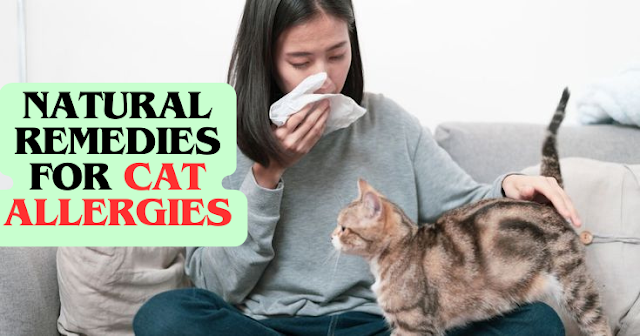Natural Remedies for Cat Allergies: Effective Relief for You and Your Pet
With positive energy and open hearts, we start.
Every living creature has a purpose in this life. Living with allergies around a cat can feel exhausting — sneezing, itchy eyes, and that constant discomfort. The good news is that natural remedies for cat allergies can often reduce symptoms by lowering allergens at home, supporting healthier skin, and improving daily comfort for both humans and cats — without depending on strong medications.
This guide focuses on practical, gentle steps that may help you reduce cat dander at home, ease irritation, and build a calmer environment over time.
Here’s a guide to effective natural solutions for both human and feline allergies.
1. Keep a Clean Environment
Keeping your home clean is one of the strongest ways to support cat allergy relief naturally, because it reduces allergens at the source:
Frequent Vacuuming: Use a vacuum with a HEPA filter to reduce dander, fur, and dust mites, which are common triggers for allergies.
Wash Bedding Regularly: Clean your cat’s bedding weekly, as well as your own sheets, to remove allergens. Hot water washing is particularly effective.
Air Purifiers: A HEPA air purifier can help trap airborne allergens in the rooms where your cat spends the most time.
2. Regular Cat Grooming
Grooming supports coat health and can help reduce the amount of dander that spreads indoors:
Brush Regularly: Brush your cat’s coat daily to reduce shedding and limit dander buildup around the home.
Natural Bathing Products: Use hypoallergenic, gentle shampoos designed for cats. Cats generally don’t need frequent baths, but an occasional bath (vet-approved) may help control dander.
3. Try Coconut Oil for Skin Health
Coconut oil may help support skin hydration, which can reduce flakiness and dander in some cats:
Topical Application: Apply a very small amount to dry patches to soothe irritation.
Add to Food (with Vet Approval): Small amounts may support coat health, but always confirm safety and dosage with your veterinarian.
4. Omega-3 Fatty Acids
Omega-3s can support skin comfort and may help reduce inflammation linked to itching:
Fish Oil Supplements: Use pet-safe omega-3 supplements and follow vet-recommended dosage.
Natural Food Sources: Salmon-based options can be helpful (in moderation and balanced diets).
5. Quercetin for Allergic Reactions
Quercetin is often discussed as a natural support option for allergy responses:
Supplement Form: Some pet-formulated products exist, but always consult your vet first before introducing supplements.
6. Apple Cider Vinegar Spray for Itchy Skin
When diluted properly, apple cider vinegar may help with mild skin discomfort:
Dilute Spray: Mix equal parts apple cider vinegar and water, then apply lightly (avoid eyes and mouth).
Avoid Open Wounds: Never apply to broken skin.
7. Local Honey for Human Allergy Relief
Some people use local honey as a lifestyle approach for seasonal sensitivity (results vary by person):
Daily Intake: Try small amounts daily if it fits your diet — it’s not a cure, but may support comfort for some individuals.
8. Maintain a Balanced Diet for Your Cat
Nutrition supports skin health, coat quality, and can influence dander levels:
High-Quality Protein: Focus on clean ingredients and avoid unnecessary fillers.
Hydration: Wet food + fresh water can support healthier skin and reduce dryness.
9. Herbal Remedies for Humans with Cat Allergies
Some herbs are used as natural support for human allergy discomfort:
Stinging Nettle: Available as tea or capsules, often used for respiratory symptoms.
Butterbur: Commonly used for seasonal sensitivity — consult a healthcare provider first.
10. Regular Vet Checkups
If symptoms persist, professional guidance ensures you’re not missing a deeper cause:
Allergy Testing: Helps identify triggers (food, fleas, environment).
Skin Checkups: Skin issues can come from sensitivities or parasites — and must be treated safely.
Living with cat allergies doesn’t mean choosing between your health and your love for your pet. With the right natural remedies for cat allergies, it’s possible to reduce triggers at home and support healthier skin for your cat — which often means less dander and more comfort.
Natural solutions work best when used consistently. Small daily habits — like brushing, cleaner air, and better nutrition — often create the biggest long-term difference.
The goal isn’t perfection — it’s progress. With balanced care and regular veterinary guidance, you can build a calm home where both you and your cat feel better day by day.
We share knowledge in good faith — the choice to apply it is entirely yours.
Thank you for being part of this journey — see you soon in another article, God willing.
📚 Scientific & Veterinary References
- American Academy of Allergy, Asthma & Immunology (AAAAI)
- Research on pet dander allergies, environmental control methods, and non-pharmaceutical allergy management.
- American Veterinary Medical Association (AVMA)
- Guidelines on feline skin health, grooming practices, and dietary support for allergy-prone pets.
- International Cat Care (ICC)
- Evidence-based information on reducing feline dander, improving coat health, and environmental allergen control.
- Cornell University College of Veterinary Medicine
- Studies on feline dermatology, Omega-3 fatty acids, and nutrition-related skin conditions in cats.
- Journal of Feline Medicine and Surgery
- Peer-reviewed research on feline allergic dermatitis, supplements, and holistic allergy management approaches.



